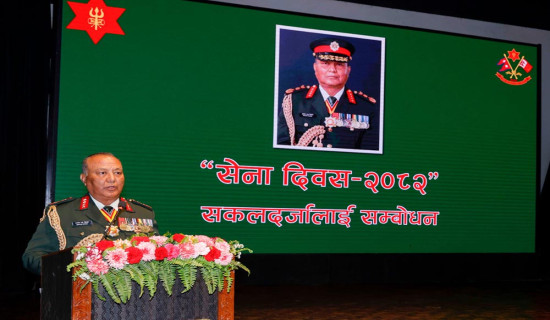- Saturday, 14 February 2026
Mayors Steal Political Limelight Globally
I do vividly remember the context during the early 1990s when the modality of elections for the chief of the local bodies was being discussed in different state and non-state forums in the country. It was following the restoration of the multiparty democracy during 1990 that the discourse about mode of elections for local government had received an impetus. As the then constitution of the Kingdom of Nepal, 1990 had provided for the Westminster model parliamentary democracy with limited monarchy, there was a politically induced bias in favour of indirect election at the local level where the chiefs of the local bodies would be chosen by the local council or assembly similar to the parliamentary model of democracy.
The indirect election for the chief of local bodies had received support from some political quarters because of the fact that it could constitute a distinct discontinuance and departure from the provision of the erstwhile non-party monopolistic Panchayat polity led by the active monarchy. Needless to say, the chief of the local institutions (Panchayats) during the pre-1990 period were elected directly by adult franchise despite political constraints and limitations.
Opportunity
However, this writer was in favour of retaining the directly elected chief of the local government chosen through multiparty competition despite the fact that it would repeat the practice and provision of the non-party Panchayat polity. This writer had contributed a series of articles in this daily then arguing in favour of the direct elected chief of the local government contending that the directly elected chief in the democratic system would have the incentives to be responsive and accountable to the people. Moreover, it would also offer an opportunity to the people to have an access to their chief executive and assess the extent to which s/he was able to fulfil the promise made to the voters.
The constitution of the Nepal promulgated in 2015 did not tinker with the provision and ensured the continuation of the direct elected chief of the local governments. But both province and federal level governments are based on the Westminster model as they are chosen by the elected parliaments at the respective levels. In fact, keeping the provision of directly elected executive at the local level through constitutional provision had been a prudent choice of the constituent assembly as it has not only guaranteed political stability but also assured governmental continuity for the entire five-year period at the local level. But the provincial and federal governments are so fragile that they are faced with incessant threats of being dislodged at any time should they lose support in their respective legislatures.
However, the local governments are firmly stabilised and face no threats of being dislodged in any eventuality. Moreover, from the performance and delivery perspectives too, directly elected mayors of the municipalities have the larger incentives to deliver and perform as per aspirations of the people. Some Mayors and chiefs of the local municipalities like Balendra Shah from Kathmandu Metropolitan City, Chiri Babu Maharjan from Lalitpur Metropolis, Renu Dahal from Bharatpur Metropolis and many others have demonstrated their leadership competence and proclivities to deliver in a very effective manner.
In India too, directly elected chief of the local government has been demanded through amendments in the respective provincial laws. In a study published in the Economic and Political Weekly, a reputed journal published from India, Niraj Kumar argues that introducing direct election of mayors could improve efficiency in urban governance. At present, mayors are elected in India by city councilors who themselves are directly elected by urban voters. Despite being considered the political and executive head of the municipal body, mayors assume a largely titular position with the government-appointed municipal commissioner holding executive power. This leaves the mayor with little authority to influence urban development, planning and operation.
In European countries too, many do prefer directly elected mayors from delivery and performance perspectives. In European countries, significant reforms of the institutional framework of their local self-government units have occurred in the last 15 years. The Resolution passed recently by the Congress of Local and Regional Authorities of Europe says that “direct election of mayors by the people is a procedure increasingly used in Council of Europe member states to appoint the head of the executive”. In another resolution it is stated that “on balance, there would seem to be a decided and indeed growing preference for more direct election” of local executive in Council of Europe countries.
Fostering stability
In the European nations like Greece, Italy, France, directly elected mayors have stolen the limelight. A report points out that independent mayors not affiliated to any party are favoured more than those representing the political groups or parties. The report points out candidly that compared to other political and administrative institutions, direct elected mayors have been regarded more favourably by the citizens, precisely because they were not part of the party-political system. As the report emphasises, “the apolitical nature of mayors, who had the general interest of their locality and its inhabitants at heart, fostered stability and dialogue at local level”.
In Greece voters believe that benefits of a mandate given directly by the citizens to a person representing the municipality as a whole far outweigh the indirectly elected mayors. However, a law that was formulated a few years ago in Greece had presented a problem for Greece’s directly elected mayors because it had established a second round of voting. So as to avoid this type of institutional deadlock, the current Greek government has adopted a law which was to apply from the municipal elections in October 2023 on and now ensured that directly elected mayors would have a major political and development role. In Italy “from Rome down to the smallest provincial villages”, mayors are elected directly by the voters thereby making him or her directly answerable to the people.
(The author is presently associated with Policy Research Institute (PRI) as a senior research fellow. rijalmukti@gmail.com)
















